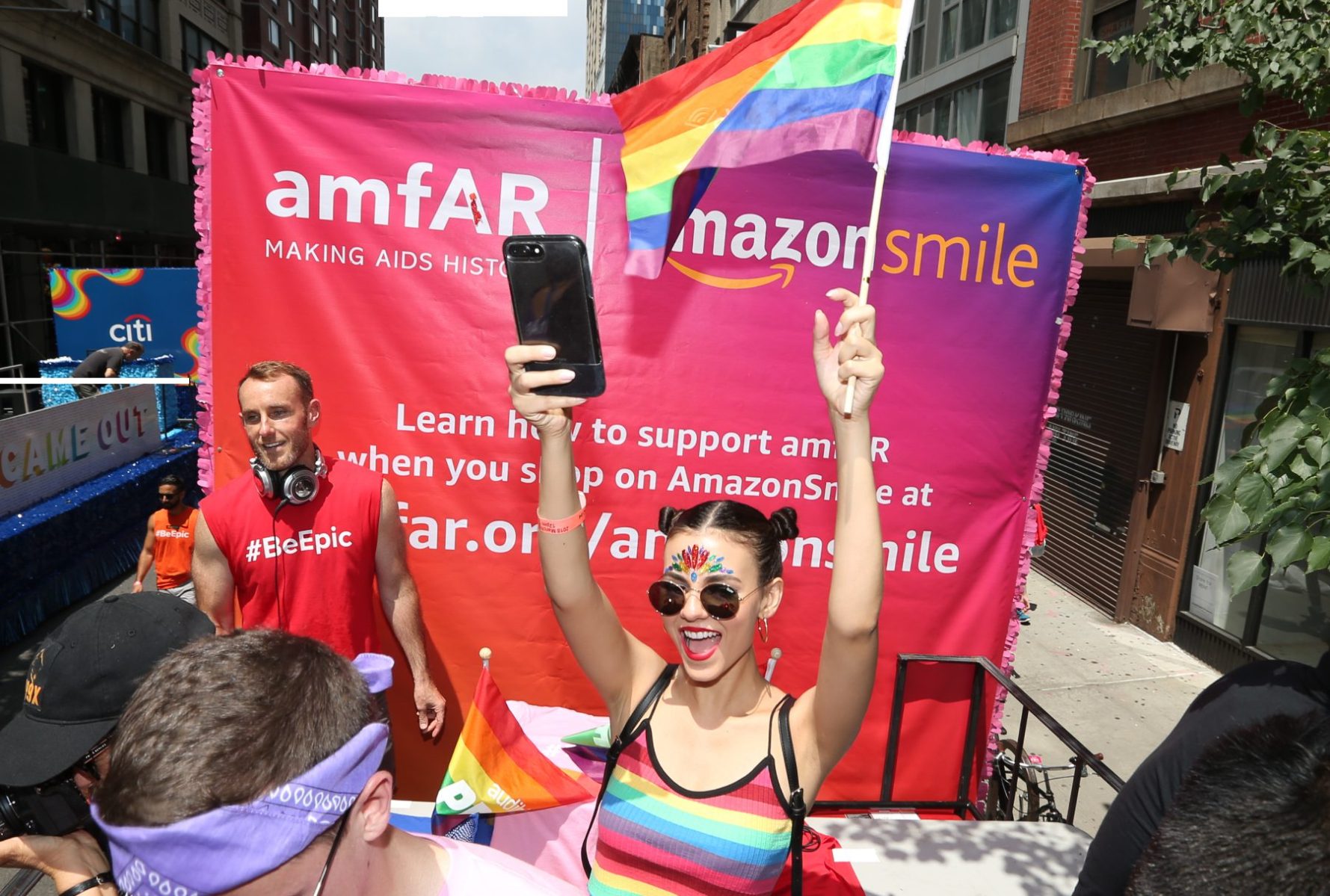*Correction appended.
After signing a pledge opposing anti-LGBTQ+ state legislation last spring, companies like AT&T, Amazon, Pfizer, and CVS Health gave thousands of dollars to the campaign efforts of lawmakers who had been backing such bills, according to a recent analysis from Data for Progress, a left-leaning polling firm.
Lawmakers in six states who wrote, signed or sponsored anti-LGBTQ+ legislation received tens of thousands and, in a few cases, hundreds of thousands of dollars, from major U.S. corporations or their employee-led PACs and affiliates, in the 2020 and 2022 election cycles, Data for Progress found.
Alabama, Florida, Arizona, Tennessee, Idaho and Texas have been prolific in their efforts to bar trans students from school sports, restrict gender-affirming care for minors and ban LGBTQ+ discussions from classrooms over the past few years.
At least seven companies and their employee-led PACs tracked by Data for Progress continued campaign donations for the 2022 election cycle to politicians backing anti-LGBTQ+ legislation after signing a pledge against such bills from the Human Rights Campaign and Freedom for All Americans. The pledge says the companies “are deeply concerned” about anti-LGBTQ+ bills and that they call for “public leaders to abandon or oppose” the legislation, but it did not explicitly address campaign donations.
Thirty companies that made campaign contributions were also official Pride sponsors in 2021 or 2022 for various cities across the country. Other companies, including General Motors, signed the pledge after making donations for the 2020 campaign cycle but have not given since then, according to the analysis, which goes through May.
Companies have long engaged in political spending that contradicts their public values while seeking to back other interests, such as favorable and unrelated legislation. This discrepancy can be particularly stark during Pride month. While the donations may not have been made with anti-LGBTQ+ bills in mind, the money carries extra weight in the states that Data for Progress studied, since lawmakers there have actually passed anti-LGBTQ+ and anti-trans legislation after introducing bills at a rapid pace, local and national LGBTQ+ advocates said.
Among the six states studied by Data for Progress, Alabama had the highest number of anti-LGBTQ+ lawmakers receiving campaign contributions from corporations or their affiliated organizations. The state recently passed a felony ban on puberty-blocking medication or hormone treatment for transgender youth — one of the strictest bills limiting access to medical care. It was blocked last month by a federal judge.
Dillon Nettles, policy and advocacy director for the ACLU of Alabama, said the funding from companies that have publicly espoused support for LGBTQ+ rights is “deeply disappointing” — and shows an inconsistent commitment to supporting the community.
“It seems really risky for companies at this point in time to be willing to backslide on that commitment knowing that this is a moment where the country is being more activated and galvanized by these attacks on trans rights, and even more broadly, LGBTQ+ rights,” he said.
Data for Progress’ analysis is also just a small snapshot of the larger campaign finance contributions that major companies have made to anti-LGBTQ+ lawmakers across the country. The newsletter Popular Information has tracked such spending for several years and has found that 25 companies eager to publicly celebrate Pride have donated $13 million since the start of last year to politicians backing anti-LGBTQ+ bills.
The 19th reached out to 16 companies for comment regarding their campaign contributions to politicians who had backed anti-LGBTQ+ legislation. Only AT&T, which made the second-most donations of any company tracked by Data for Progress, and State Farm, responded. Donations attributed to State Farm came from PACs run by its agents, not the corporation itself, a spokesperson said.
When taking public positions on government policies, AT&T focuses on areas such as broadband access and expansion, spokesperson Alex Byers said in an emailed statement.
“Contributions to a particular lawmaker do not mean we support their views or actions on every issue,” he said. “We are mindful of diverse and complex societal issues that affect us, and we most immediately address these issues through direct social programs, philanthropy, employee benefits, and community involvement.”
None of the lawmakers named in this story returned requests for comment.
Victoria Kirby York, deputy executive director of the LGBTQ+ advocacy organization National Black Justice Coalition, said that as anti-trans rhetoric among Republican lawmakers grows and more bills are actually making it into law, corporations that want to support LGBTQ+ people need to reevaluate their relationships with state politicians.
“There’s definitely a cognitive dissonance in saying you’re about equality and discrimination protections and for racial justice and LGBTQ+ equity and all of the things, and then to give millions upon millions of dollars to people working to undermine and demolish those protections,” they said.
In Data for Progress’ analysis, contributions to Texas Gov. Greg Abbott’s campaigns account for well over half of the total money spent on anti-LGBTQ politicians across these six states. He received just over $2.2 million, primarily from three Texas-based companies and their affiliates and employee-led PACs: Toyota, AT&T and Enterprise Products Partners, an oil and gas company, per Data for Progress’ count.
Alabama Gov. Kay Ivey, the second-highest-funded politician the organization tracked, received $302,000 for her reelection efforts, the bulk of it coming from Southern Co., which oversees Alabama Power. Several of her recent campaign ads have specifically showcased her support for anti-trans bills. Texas Attorney General Ken Paxton ranked third in campaign contributions at $192,000, with USAA and Farmers Insurance making the biggest donations.
In Texas, the state legislature held back-to-back special legislative sessions in 2021, with the last two specifically called to discuss anti-trans measures, among other bills. This year, Paxton issued an opinion labeling gender-affirming care as child abuse, and under Abbott’s order the state began investigations into families accessing gender-affirming care for their children. (The ACLU and Lambda Legal have filed another lawsuit to block state probes.)
Following months of those legislative sessions, Toyota, a Pride sponsor for Los Angeles this year, contributed $150,000 to Abbott’s reelection efforts in December, Data for Progress found. AT&T, which signed the Human Rights Campaign and Freedom for All Americans pledge against anti-LGBTQ+ legislation last spring, gave $10,000 to Paxton’s campaign in February this year.
To Adri Pérez, a policy and advocacy strategist at the ACLU of Texas, the campaign funds are a clear signal that many corporations will put their own self-interests ahead of standing with LGBTQ+ people.
While Pérez said companies need to be held accountable, they aren’t sure this is possible unless everyone makes a conscious choice to put that pressure on — including the LGBTQ+ groups platforming businesses that say they support LGBTQ+ rights.
“Do they have to be held accountable? Yeah. Are they going to change their minds? I don’t know,” they said.
Emmett Schelling, executive director of the Transgender Education Network of Texas, said that making a pledge to oppose anti-LGBTQ+ legislation while funding politicians who back these laws is ultimately meaningless. Advocates need meaningful help to get out of a “continued cycle of horrific moments,” he said, and to him that means going beyond publicly denouncing legislation after the fact.
Companies need to commit to employ more trans people, to provide benefits for queer families, and to not funding elected officials targeting trans youth, he said — while consumers need to reject a lack of integrity from companies who publicly back LGBTQ+ rights.
“It’s not going to change overnight,” he said. “And at the end of the day, the people have the power to intervene in this.”
Rachael Salisbury, vice president at a political research firm for progressive campaigns, who co-authored the Data for Progress analysis as a fellow for the organization, said she hopes that Pride organizations will use the data to screen companies that want to sponsor their events — and that companies will stop such donations.
When companies sign pledges against anti-LGBTQ+ bills, including the pledge by HRC and Freedom for All Americans, “those are just pretty words at this point,” she said.
“I want to give those leaders of those companies the benefit of the doubt, and hopefully they're not being intentionally duplicitous, but even if it is just carelessness, we can't tolerate that in our allies anymore,” Salisbury said.
HRC and Freedom for All Americans said in emailed statements that working with companies on issues like political contributions or private lobbying, respectively, are key parts of their advocacy work for LGBTQ+ rights.
"We encourage companies not to donate to anti-LGBTQ+ politicians, and to reckon with how damaging and harmful those donations are to the community, including their own LGBTQ+ employees,” HRC press secretary Aryn Fields said in a statement.
“Companies have a singular ability to gain audience with lawmakers across the political spectrum, and can help share both the human and business reasons that this kind of policymaking is at odds with corporate values, public opinion, and long-term competitiveness,” Freedom for All Americans communications VP Angela Dallara said in an emailed statement.
On whether LGBTQ+ groups should ask companies for financial commitments when signing pledges against anti-LGBTQ+ bills, or if something should be done differently on such letters, Freedom for All Americans does not have a position, Dallara said. HRC declined to comment on what changes should be made to such pledges.
Disclosure: Pfizer, CVS Health, the Human Rights Campaign, and the chairman of Enterprise Product Partners, Randa Duncan Williams, have been financial supporters of The 19th.
Correction: An earlier version of this article did not specify employee-led PACS and affiliates were among the donors who were counted in the data.







